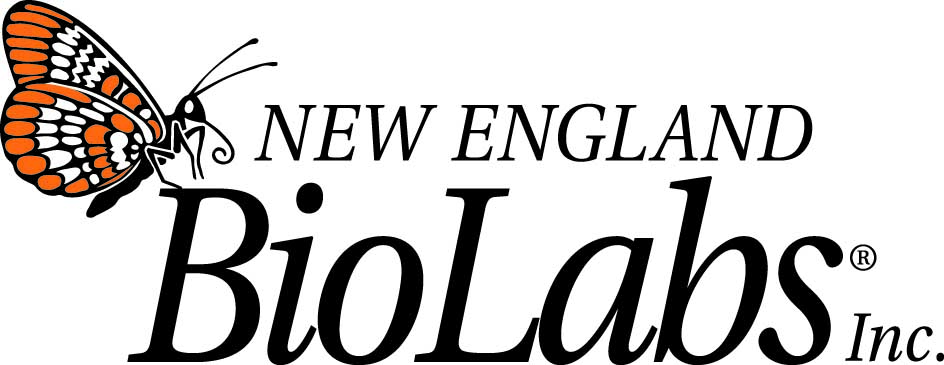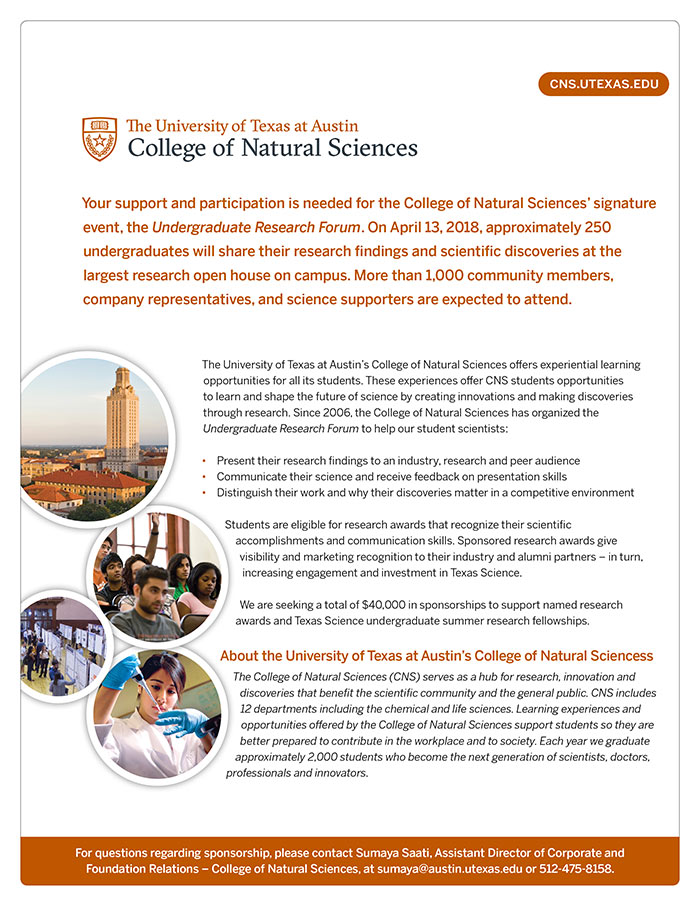2022 Sponsors
Thank you to our Forum 2022 Sponsors!


Resources
College of Natural Sciences
Funding
Learn about College of Natural Sciences fellowships available to support research as well as funding opportunities supported by the federal government, national science organizations, and industry.
Poster Printing
The Office of Diversity and Student Programs has a poster printer that can be used in support of on-campus poster sessions (for degrees or departments), or for poster assignments in courses. However, our facility is not staffed as a full-service printing facility, and course-based printing and on-campus event printing must be coordinated with our office in advance. Requests must be submitted at least one week in advance of the event or due date. Requests may take up to five business days to process (from file submission to poster pick-up). Additionally, course-based posters are limited to a canvas size of 24 x 36 inches.
Join the more than 400 student researchers who present their research at the annual CNS Undergraduate Research Forum. Students from UT and schools across Texas participate in the Fall Undergraduate Research Symposium.
Support for travel to conferences
Attending national and international conferences is an important activity for undergraduate researchers. Often students are able to find support to fund part or all of their travel to the meeting.
CNS Career Services
Career advisors can help your create and update your resume, review application materials and set up mock interviews.
Poster Stands
We provide poster stand reservations to units within the College of Natural Sciences.
Campus-wide
Office of Undergraduate Research (OUR)
Find support and resources for student engagement in research and creative activity in disciplines across the campus.
EUREKA!
The research database offers extensive information on how to publish your work, how to obtain funding, how to do research abroad, and how to use your research experience to augment your resume and improve your chances of getting the right job or getting into the right school.
Undergraduate Writing Center
Writing consultants can help you prepare your personal statements and review proposals.
Study Abroad Office (TEXAS Global)
Find out how to incorporate research or an internship into your study abroad experience.
Getting Started
Schedule a consult: CNS peer ambassadors are available to meet with students who are interested in finding a research placement.
Make an appointment with an ambassador.
Make an appointment with Lynda Gonzales, Director for Student Engagement and Outreach.
View FINDING A RESEARCH PLACEMENT ON CAMPUS - a step-by-step guide to identifying possible research groups to work with and contacting potential faculty supervisors.
**********
Step 1: Explore and Identify your interests
- Ask yourself ... What are you genuinely interested in? What drew you to science in the first place? Are there courses/topics that you want to know more about? Is there a particular research area or topic you have in mind?
Step 2: Come up with a list of 3-5 faculty members who are doing research that is a good fit for your interests.
- Browse CNS departmental faculty profiles (https://cns.utexas.edu/about/departments).
- Use your network – speak with faculty members/instructors, TA’s, your peers, advisors, etc.
- Check out EUREKA!, UT Austin’s searchable database supporting undergraduate research (https://eureka.utexas.edu/).
- Join the CNS experiential learning list (https://utlists.utexas.edu/sympa/info/cns-experiential-learning) to hear about research-related opportunities and events
Step 3: Prepare to contact faculty members.
- Come up with a list of 3-5 faculty members you’d like to contact about assisting on a project.
- Plan to contact them one at a time.
- Before contacting, find the list of recent publications by this person. Browse titles and abstracts.
Step 4: Email faculty members.
What should you include in an e-mail?
- Use professional, formal writing, and keep your message brief.
- Introduce yourself and give your background and qualifications.
- Show interest in the research taking place in that group, not just in your personal gains.
- Express interest in assisting on the project.
- Ask if there’s a convenient time to meet to discuss project and possibilities.
- Include your full contact info.
- For sample e-mails, see the resource section at the bottom of this page.
Step 5: Meet with faculty member.
Prepare to answer these kinds of questions:
- Why do you want to get involved in research?
- What is it that made you want to join our research group?
- How much time can you dedicate to research? (hrs/week and number of semesters)
Step 6: Do research!
What if all goes well and you join a research group?
Clear communication from the outset is important.
Research can be done as a volunteer, for course credit, or sometimes, for more advanced positions, for pay. Speak with your faculty supervisor about options.
Negotiate a plan/schedule with your faculty mentor. Keep your commitment. Ask if anything is unclear.
Ask key questions like:
- Is there any reading I should do to prepare?
- Is there a weekly lab meeting I should plan to attend?
- Who should I schedule my lab time with?
- What other expectations do you have?
Resources:
- This step-by-step guide for writing an email to faculty is a good resource from the University of California, Berkeley.
- Here's a collection of sample emails from the University of California, Santa Cruz.















